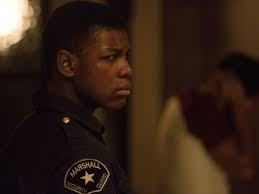Dog’s Movie House: “Detroit” A Searing, Timely Drama!
Howdy Folks! It’s The Kendog!
There are some excellent films that are admittedly difficult to sit through due to the unflinching nature of the filmmaker’s techniques of showcasing brutal events on screen. Kathryn Bigelow’s latest “Detroit” is one of those films. Detailing the terrifying events that took place at the Algiers Motel during the riots in Detroit in 1967. Along with her frequent writing collaborator Mark Boal (“The Hurt Locker,” “Zero Dark Thirty”), Bigelow and her crackerjack cast puts the screws to the audience from the very beginning and doesn’t let up until the end credits roll. This is a film that depicts a terrible time in our nation’s history and serves as a timely reminder that. although we’ve made progress in terms of racial relations, we still have along way to go.
“Detroit” starts with an animated history of what lead to the Detroit riots in 1967, then quickly turns brutal as it depicts a mass arrest at an unauthorized after-hours club. According to the narrative of the film, the police department’s rather rough treatment of the people arrested serves as the lit match that turns Detroit into a blazing inferno of anger fueled by racial injustice. As the riots continue, we follow several characters who will all eventually meet on that fateful night at the Algiers Motel. Chief among them are a security guard named Dismukes (John Boyega), the lead singer from and up-and-coming Motown group and his best friend (Algee Smith and Jacob Latimore), and a violent racist cop named Krauss (Will Poulter) who is already on the hook with his superiors for killing an unarmed man by shooting him in the back.
These players and many others end up at the Algiers Motel, many of whom are there to relax and wait out the violence that’s decimating their city. Things change rapidly when one of the guests at the hotel, in a fit of anger, fires a starter’s pistol out of his window at a nearby national guard unit. The unit, fearing sniper fire for the past three days, reacts with overwhelming force and unloads a fusillade of bullets into the hotel. Then, led by Krauss and his two cronies (Jack Reynor and Ben O’Toole) they storm the hotel and round everyone up for interrogation, convinced there is a gun in the building. Krauss and his boys resort to more and more terrifying tactics to gain a confession even as it becomes more and more obvious there is no real weapon in the hotel. Events begin to spiral out of control and soon deaths are involved.
The acting work here is uniformly outstanding, with Poulter standing out as the racist Krauss. He’s an easy character to hate, but Poulter is able to give him just enough humanity to make you believe there’s a shred of hope for him. That it never manifests in his actions doesn’t matter: it’s a layered performance that makes Krauss one of the most disturbing villains in cinematic history. Boyega is also very good a Dismukes, the black security guard who does what he can to keep the folks at the Algiers alive. You also get good supporting work from Smith and Latimore as well as Anthony Mackie as a veteran who manages to find the right mix of defiance and obedience to survive the night. Also very good are Kaitlyn Dever and Hannah Murray as the two young white women also accused at the Algiers, presumably being punished for having the gall to fraternize with young black men.
https://youtu.be/7zQLxowctjo
The overt acts of racism in “Detroit” are confined to Krauss and his partners, which is a good decision from a narrative standpoint. It makes the racism a personal issue and allows for small glimmers of hope, such as the national guardsman who helps one of the prisoners escape before being shot, or the white police officers who rescue Algee Smith after he makes his escape. Don’t get me wrong: institutionalized racism is all over the place in “Detroit” but that is to be expected as the film takes place at the height of the civil rights movement in 1967. But by having the most brutal acts of racial violence confined to Krauss and the other two police officers, it helps “Detroit” achieve more of a balance between hope and despair. Bigelow also follows the aftermath of the Algiers incident, including the trial of the cops and their not guilty verdict, rightfully showing that justice is not always served in a courtroom, particularly when cops were on trial with an all-white jury during 1967. This is not a feel-good movie folks, but it’s exceptionally well made and deserves to be seen by as many people as possible. 5 Out Of 5 On Kendog’s Barkometer! So Sayeth The Kendog!





Leave a Reply